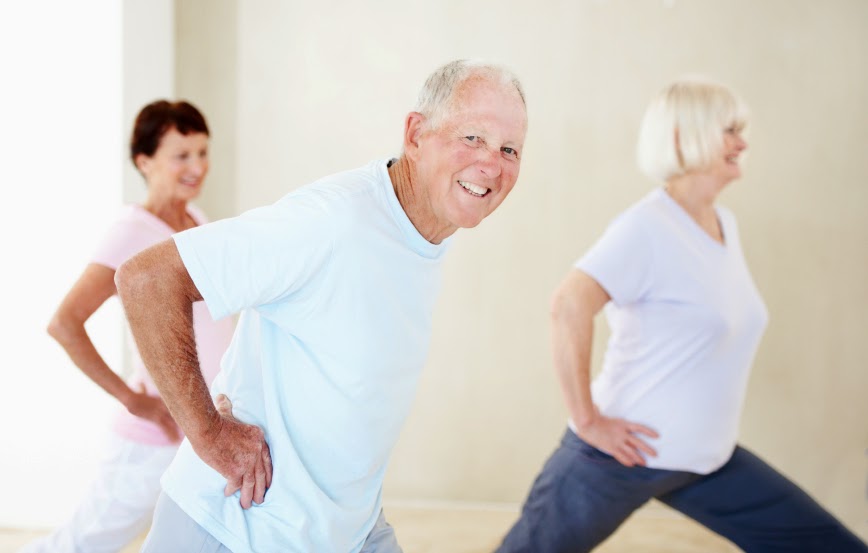As the baby boomer generation reaches the age of retirement, seniors now make up the fastest-growing age group in Canada. By 2030, it is expected that 23.6% of Canadians will be age 65 or older. To give some perspective, in 2013 a mere 15.3% of the Canadian population was 65 or above.
How Aging Affects Your MSK Health
 Not surprisingly, as we age and our bodies accumulate the effects of daily wear and tear, our musculoskeletal (MSK) system can become compromised as we are more susceptible to injury. Stiffer muscles, decreased range of motion and a loss of elasticity of connective tissue (ligaments, tendons and muscles) can decrease mobility and affect balance. Vertebrae and other bones lose some of their mineral content with time. For the spine, this can result in decreased vertebrae height, narrowed foramen and even compression fractures. Hip and knee joints may also lose cartilage. The healing process can be slowed and repair can take longer. This is more pronounced in the vertebral column.
Not surprisingly, as we age and our bodies accumulate the effects of daily wear and tear, our musculoskeletal (MSK) system can become compromised as we are more susceptible to injury. Stiffer muscles, decreased range of motion and a loss of elasticity of connective tissue (ligaments, tendons and muscles) can decrease mobility and affect balance. Vertebrae and other bones lose some of their mineral content with time. For the spine, this can result in decreased vertebrae height, narrowed foramen and even compression fractures. Hip and knee joints may also lose cartilage. The healing process can be slowed and repair can take longer. This is more pronounced in the vertebral column.
Common Age-related MSK Conditions
Degenerative changes to the MSK system start developing around age 30, and like everything relating to our health, is impacted by the choices we make every day. Chiropractic care can be very effective in helping seniors with pain management, range of motion, joint degeneration, posture and balance. Thinking about age-related degeneration should not be put off until you’re older; making choices now that promote health can help slow the process.
Some of the most common age-related MSK concerns are osteoporosis, spinal stenosis and limited mobility, and there are simple steps you can take to reduce your chances of developing them.
Tips for Optimizing MSK Health in Your Later Years
1. Diet
A diet rich in micro nutrients helps to decrease the risks of developing bone defects and muscular weakness. Make sure you get adequate amounts of vitamins C and D throughout your lifetime to promote healthy functional growth of muscles and bones, as well as calcium for strong bones to help avoid osteoporosis
 2. Stretching
2. Stretching
An active lifestyle benefits everyone, but it may be of particular benefit to seniors, as it also helps to relieve depression and isolation. Regular stretching exercises such as yoga can help maintain joint flexibility and slow age-related stiffening and shortening of the muscle fibers.
3. Strength Training
Weight training for the elderly may not sound like a good idea, but a 2007 study showed that strength training for six months can actually improve cell function, help preserve muscle strength and even reverse age-related cell impairment. The study compared the muscle strength of older adults to a sample of younger adults. Before the six-month period of strength training, the older group was 59% weaker than the younger group; at the end of training, they were only 38% weaker.1 Weight-bearing exercise, such as walking or weight training, has also been shown to help maintain bone mass, and twisting or rotational movements are beneficial for flexibility and balance.
4. Falls Prevention
A leading cause of morbidity and mortality among seniors is accidental falls. In fact, one in every three Canadians over age 65 will fall at least once in a year. This is due, in large part, to poor balance and limited mobility brought on by age-related changes to the MSK system. Check out our Best Foot Forward Program for tips on safeguarding the home and preventing falls.
5. Posture
Postural changes commonly associated with aging can also affect balance. As your body ages you can expect gradual changes, such as flattened foot arches and decreased vertebrae height, which can have an impact on how we walk or how we stand. However, conditioning your body starting now can minimize these changes and your ability to perform certain tasks later in life. Download the free Straighten Up Canada app and teach your body good posture now for a taller and stronger future.
No comments:
Post a Comment